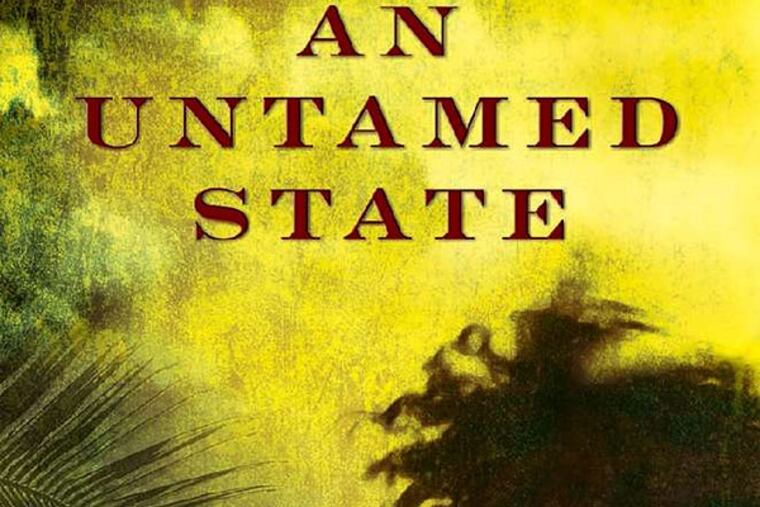Haiti brutally rendered
In my friend Hil's house hangs an assortment of colorful Haitian paintings from the 1970s showing a cornucopia of fruits, fishes, billowing palms, and people in colorful clothing.

An Untamed State
By Roxane Gay
Black Cat. 360 pp. $16 paperback
nolead ends nolead begins
Reviewed by Abby Frucht
In my friend Hil's house hangs an assortment of colorful Haitian paintings from the 1970s showing a cornucopia of fruits, fishes, billowing palms, and people in colorful clothing.
No doubt these chaotically joyous images were idealistic even in their day, meant to convey the dreams of the people they depicted, as well as the fantasies of the wealthy Haitians and tourists who bought them. While it's possible such illusions are still for sale in Port au Prince, readers of Roxane Gay's new novel are unlikely to flock there to buy them anytime soon.
To say that An Untamed State "tells the story" of Mireille Duval Jameson - an American lawyer, wife, and new mother, who, while visiting her Haitian parents in Port Au Prince, falls victim to the wave of kidnappings plaguing that city - would be inadequate. Rather, Gay compels her readers to breathe and bleed that horror, and crawl free of it only as bruised, scarred, and damaged as Mireille herself.
The book could be a challenge on reality TV: Read it, and if you can walk upright away from it, here's a million dollars. That's what the Commander, Mireille's kidnapper, requests in exchange for her safe return, and that's what Mireille's father, Sebastian, a self-made millionaire in whom "ambition and ruthlessness" are synonymous, refuses to give.
In response, the Commander treats Mireille "as both lover and enemy, the only way he could understand a woman," violently demonstrating the age-old fact of women's bearing the brunt of male conflict everywhere. Mireille refuses to scream or cry, at first because she doesn't want her torturer to know how badly he is hurting her, but later because she becomes, in her words, "a woman who is no one divided by the memory of the woman she used to be."
Unable to bring so much as a molecule of her legal training to bear on the lawless enterprise of her captivity, she describes her captor's "seed staining my thighs, his teeth in my skin, his saliva on my face, his blades and his fire. . . . He flipped me around so I was facing the wall. His hands were everywhere. I tried to twist my body free. I kicked my legs back trying to make contact with his knee. . . . I couldn't stop laughing. I don't know why. . . . There we were, alone with the stink and the sweat of ourselves. . . . I understood what he was about to do, what he could still take from me. I screamed, 'No.' "
Best known so far for her sharply intellectual social and literary commentary, Gay, who dedicates this novel to "women, the world over," here employs an emotive and incantatory physicality by which her novel's title achieves multiple meanings. Mireille's captors are untamed; her husband is too tame; her baby, Christophe, still screaming for his mother's absent milk, is yet to be tamed; and Mireille, unhinged, if she ever was tame will never be tame again.
Some readers will thrive on the novel's immediacy. Others will yearn to step back from it enough to learn more about the untamed state of Haiti itself. The novel opens with some tantalizing remarks - "We loved Haiti. We hated Haiti. We did not understand or know Haiti" - that become frustratingly ambiguous. Mireille's American neighbors offer "their own desperate pieces of information . . . about [Haiti's] violence and the poverty and the hopelessness, conjuring a place that does not exist anywhere but in the American imagination," while her father, hosting a party outside his Port au Prince mansion, enacts a luxuriant "Haiti that does not exist, or perhaps once existed but is fading away."
I don't know to what degree Sebastian's version of his country ever did exist, but Mireille would likely have some idea, and the astute Gay surely has her own thoughts on the subject. When and how did the tropical paradise of my friend Hil's paintings, if it ever was even close to reality, become so "run through with anger" that the earthquake of 2010 wrought catastrophe upon an "already broken place" - a land so lacking in law, trust, and order that if tomorrow's kidnap victims escape their captors, there will be no place safe for them to run?
These questions, so brutally and vividly rendered, remain unanswered here.